Daily Writing
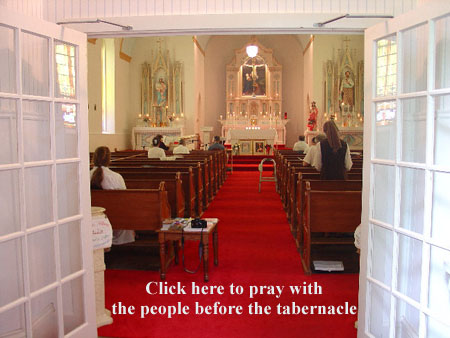
| Shepherds of Christ Daily Writing |
 |
November 18, 2009
|
November 19th Holy
Spirit Novena |
The Novena Rosary
Mysteries |
We really need funds
for the priestly mailing.
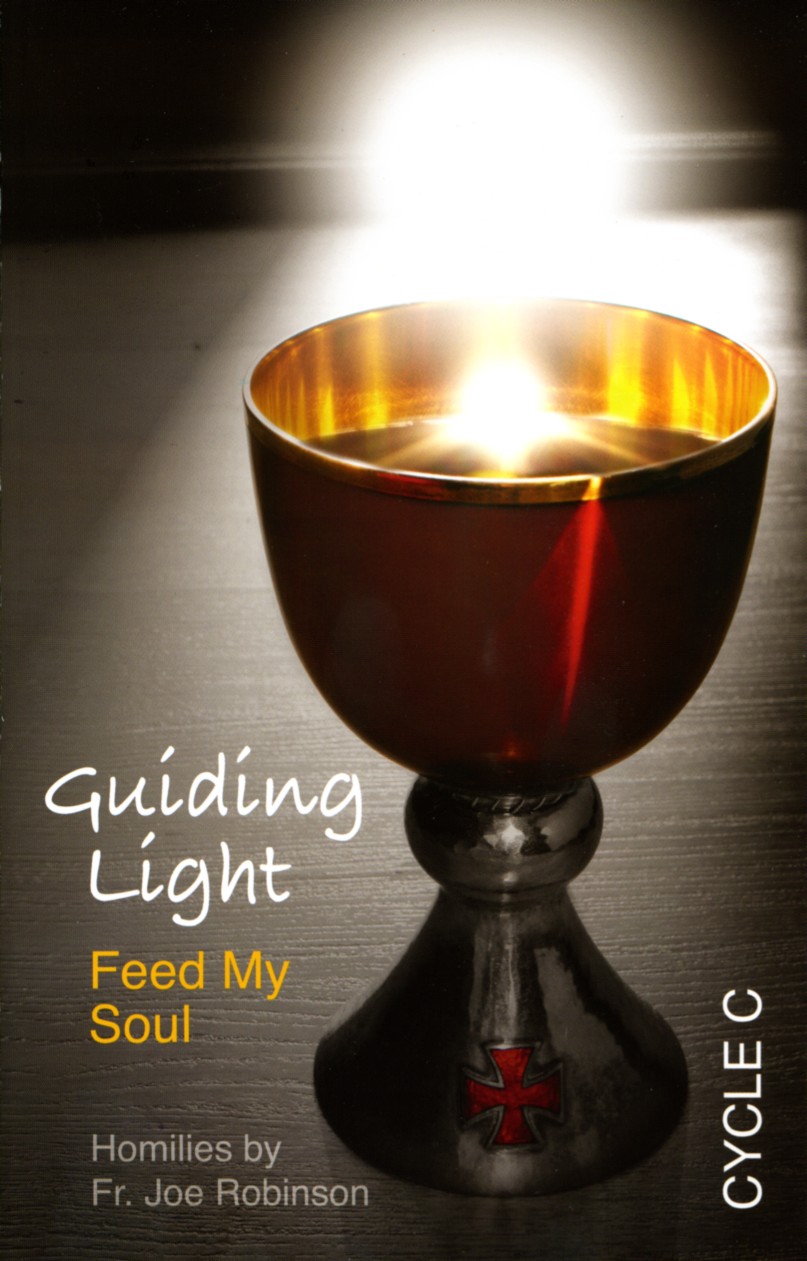
Please pray for an
urgent intention.
November 18, 2009
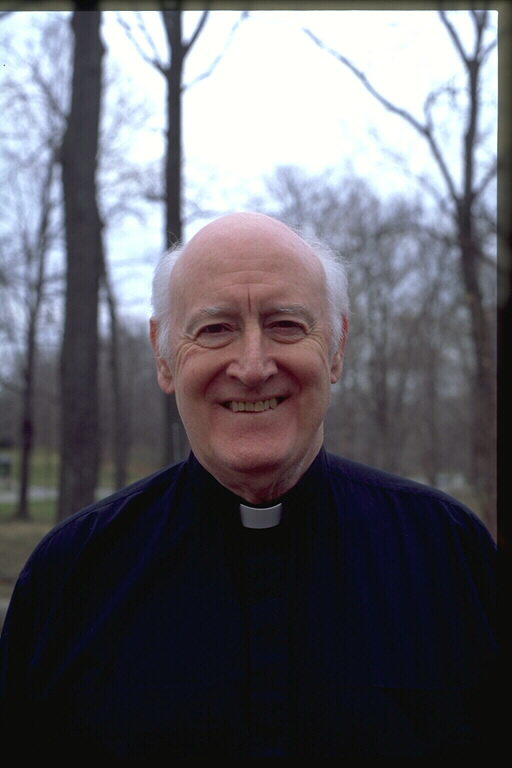
Author of more than 18 books
Doctorate
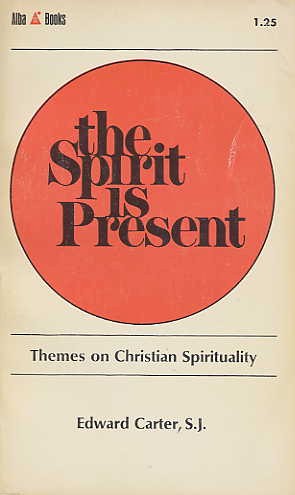
Excerpt from The
Spirit is Present p. 75
The Eucharist is
the main setting for the celebration of the
Christian community. Some liturgies are very
special moments of celebration, for example,
those of Easter and Christmas. But daily
liturgies are celebrations, too, although
obviously on a lesser scale when compared to the
major liturgical feasts. The daily liturgy can
truly be called celebration because a special
event — the Christ event — is always being
called to memory and sacramentally reenacted.
Furthermore, each liturgy does briefly raise us
above — notice, we are not saying falsely
separates us from — the ordinary setting of our
lives. The liturgy, then, as do other
celebrations, affords us the opportunity of
special reflection upon a special event. The
Eucharistic celebration calls to mind the entire
Christ event as centered in the death and
resurrection of Jesus. Refreshed by the special
setting of the Eucharist, and nourished by
Christ Himself, we are meant to return to the
secular framework of life with a deepened desire
to live Christ.
Excerpt from
Response in Christ, pp. 80-94
However, as we have said, Christ is not the only
victim of the eucharistic sacrifice. The members
of His Body, the Church, are also victims along
with Christ. Those members must also be in a
state of victimhood. As with Christ, they cannot
undergo a bloody immolation. Their immolation
must also be a mystical one. How is this
accomplished? We can look to two passages of the
encyclical Mediator Dei for thoughts on
such a mystical immolation. In one passage we
read that pride, anger, impurity and all evil
desires are to be mystically slain. As the
Christian stands before the altar, he should
bring with him a transformed heart, purified as
much as possible from all trace of sin.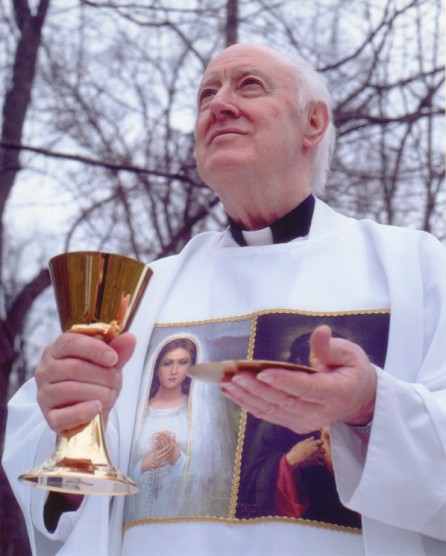
27
Positively considered, such a transformation
means that the Christian is striving to grow in
the supernatural life by all possible means, so
as to present himself always as an acceptable
victim to the heavenly Father.
In another passage of the same encyclical this mystical immolation of Christ's members is further developed. To be a victim with Christ means that the Christian must follow the gospel teaching concerning self-denial, that he detest his sins and make satisfaction for them. In brief, the Christian's victimhood means that he experiences a mystical crucifixion so as to make applicable to his own life the words of St. Paul, "I have been crucified with Christ. . ." (Ga 2:19).28
Jungmann has a beautiful passage concerning the Christian's eucharistic immolation. He states: "Every sacrament serves to develop in us the image of Christ according to a specified pattern which the sacramental sign indicates. Here the pattern is plainly shown in the double formation of the Eucharist; we are to take part in His dying, and through His dying are to merit a share in His life. What we here find anchored fast in the deepest center of the Mass-sacrifice is nothing else than the ideal of moral conduct to which the teaching of Christ in the Gospel soars; the challenge to an imitation of Him that does not shrink at sight of the Cross; a following after Him that is ready to lose its life in order to win it; the challenge to follow Him even, if need be, in His agony of suffering and His path of death, which are here in this mystery so manifestly set before us."29
Summarily, then, we become victims with Christ by lovingly conforming our wills to the Father's will in all things. Such conformity was the essence of Christ's sacrifice, of His victimhood, and of His immolation. A similar conformity must be in the victimhood and the immolation of Christ's members. This mystical immolation is a lifelong process. The ideal is that each Mass participated in by the Christian should mark a growth in his victimhood. The true Christian desires to die more and more to all which is not according to God's will so that he may become an ever more perfect victim with Christ.
4) The Father's Acceptance of the
Eucharistic Sacrifice
It has been observed that if sacrifice is to have its desired effect, it must be accepted by God. That the Father always accepts the eucharistic sacrifice is certain. For the principal priest and victim is Christ Himself, always supremely acceptable to the Father. As for the subordinate priests and victims, they are, taken together, the People of God, the Church herself.
There is always an acceptance on the Father's part even as regards this subordinate priesthood and victimhood of the Mass. For even though the Mass may be offered through the sacrilegious hands of an unworthy priest, there is always a basic holiness in the Church pleasing to God. Because of such holiness the Father always accepts the Church's sacrificial offering, for the Mass is the sacrifice of the whole Church, and cannot be fundamentally vitiated by the unworthiness of any particular member or members, even if that member be the officiating priest.
What do we say concerning the Father's acceptance of the sacrificial offering of the individual Christian? Such an offering will be acceptable in proportion to the Christian's loving conformity of will to the Father's will. Speaking of the Christian's participation in the Mass, Jungmann says: "It follows that an interior immolation is required of the participants, at least to the extent of readiness to obey the law of God in its seriously obligatory commandments, unless this participation is to be nothing more than an outward appearance."
30Having considered in successive sections the immolation and acceptance elements of the Mass, we should consider the vital link between these two. For just as the two are inseparably connected in Christ's sacrifice, so are they also united in the Church's sacrifice of the Mass.
In Christ we equated the immolation of His sacrifice with His passion-death, and the acceptance element with His Resurrection. Uniting these two mysteries of death-resurrection, we spoke of Christ's paschal mystery. We have seen that this mystery had been prefigured by the Jewish pasch and exodus, component parts of the Jewish people's transition to a new and more perfect life. In the case of Christ, we considered His pasch – His passover – to be a transition from the limitations of His mortal life to the state of resurrected glory. We speak of Christ's mortal humanity as having exercised limitations upon Him in this sense, that, although He Himself was completely free from sin, He had exposed Himself to the conditions of a sin-laden world through His human nature. In His death-resurrection He changed all this as He conquered sin, as He redeemed us, as He passed to the state of glory with His Father.
What happened in Christ also occurs in His Mystical Body, the Church. The Church and Her members experience their own transition from death to resurrection. The entire Church and the individual Christian express, through the Mass, a willingness to grow in the participation in Christ's death. The Father accepts this willingness and gives an increase in the grace-life, a greater share in Christ's Resurrection. This process happened within a short span of time in Christ's life. In the life of the Church it continually takes place until Christ's second coming. The Church, with her grace-life of holiness, has already partially achieved her resurrection, but not completely, even though she continues to grow in grace. St. Paul bears witness to this: ". . . but all of us who possess the first-fruits of the Spirit, we too groan inwardly as we wait for our bodies to be set free." (Rm 8:23).
Vatican II's Constitution on the Church beautifully portrays this fused state of death-resurrection which the Church in her members experiences here below as she awaits the fullness of the resurrection in the world to come: "For this reason we, who have been made to conform with him, who have died with him and risen with him, are taken up into the mysteries of his life, until we will reign together with him. . . While still pilgrims on earth, tracing in trial and in oppression the paths he trod, we are anointed with his sufferings as the body is with the head, suffering with him, that with him we may be glorified. . ."
31
5) Partaking of the Eucharistic Meal
The cycle of the eucharistic sacrifice is completed as the priest and faithful partake of Christ the paschal lamb. The People of God have given Christ to the Father. Now the Father gives Christ to the Church's members in the eucharistic meal. Although the priest alone must communicate to assure the integrity of the sacrifice, it is highly desirable, of course, that all present partake of the eucharist.
In the sacrifices of old, the victim of the sacrificial banquet was considered in some sense divine by the fact that it had been offered to the divinity. In the sacrifice of the new covenant we receive divinity itself through the sacred humanity. With such a marvelous conclusion to the eucharistic sacrifice, the fruits of Christ's sacrifice of Calvary are continually experienced.
There are other truths to be considered under the paschal meal aspect of the Mass. One of these is the concept of the eucharist as sign and cause of unity. Von Hildebrand comments on this: "All receive the one body of the Lord, all are assimilated into the one Lord. Even if we leave aside the supreme ontological supernatural unity which is realized here, the very act of undergoing this experience represents an incomparable communion-forming power."
32Through the sharing of the one paschal lamb, the Christian assembly has thus been vividly reminded of their oneness in Christ. Yet this is a oneness in plurality. For each Christian is a member of the one Body of Christ in his own unique way. He has been called upon to assimilate Christ according to his own personality, vocation and graces. Consequently, just as the members of the People of God are reminded of their unity at Mass, so are they made aware of their own uniqueness as they depart from the eucharistic assembly, each carrying Christ to his own particular environment according to his own individual personality.
We have considered the Church's eucharistic sharing in the mystery of Christ according to a sacrificial structure. With the general structure of the Mass established, we will now enlarge upon the concept of the participation of the individual.
d) The Christian's Participation in the Mass
God has created man a social being. This fact has relevance as regards man's salvation and perfection. Man does not go to God alone, but rather is saved and perfected with and through others. This is evident in the study of salvation history as one observes God communicating Himself to man in the framework of community. As we have seen, this social dimension is also readily evident in the liturgy.
As we now discuss the individual's participation in the liturgy, we in no way intend to underestimate the communal aspect of the eucharistic sacrifice. We constantly presuppose it and its importance. Liturgy as communal is the indispensable framework and background for any discussion of the individual's liturgical participation.
Granted all this, it is still useful and necessary to speak of the individual's participation in the Mass.
33 Ultimately it is the individual as individual who accepts or rejects God's offer of salvation and sanctification. Therefore, to speak of the individual's response to God in the liturgy is highly significant. Despite all the communal helps the individual receives in the liturgy, despite the fact that the individual must always be deeply aware that he is a member of the community, the People of God, it is still true to say that it is within the depths of his own mysterious, individual personality that the Christian either becomes a mature Christian through the liturgy or fails to do so. With such preliminary ideas established, let us now consider the Christian and his role in the Mass.
1) The Baptized Christian and the Mass
Once again the reader is reminded that through baptism the Christian becomes incorporated into Christ and His Church. Confirmation perfects this incorporation. Although baptism incorporates us primarily into Christ's death and Resurrection, we again stress that it also unites us with Christ in all His mysteries. This is so because all Christ's mysteries are essentially one mystery, for none of them stands separately by itself. Consequently, one cannot be initiated into Christ's paschal mystery without simultaneously being incorporated into all of His mysteries.
The fact that all of Christ's various mysteries are contained in the total mystery of Christ enables the Christian to encounter the entire Christ in the liturgy. Mention of this fact brings us to our next point.
In baptism the Christian first encounters and relives the mystery of Christ. He thereby receives a new life. But this life must be nourished. The Christian must constantly re-encounter the mystery of Christ, and this he does chiefly through the eucharistic liturgy. Here the Christian is daily privileged to encounter Christ in the most intimate fashion. Here above all he exercises his priesthood and consequently grows in supernatural vitality. We use the word exercise purposely, since the liturgy is primarily an action, an exercise of the priestly office of Christ.
Since the baptized Christian is sacramentally participating in the mystery of Christ at the Mass, his priestly act must be modeled after that of Christ's. This is true because the life of grace flowing out of the seals of baptism and confirmation is structured according to certain modalities or characteristics based on the life of Christ. This truth was developed at some length in the previous chapter. There we stated that Christ, the head of the Mystical Body, has determined, through His own life of sanctifying grace, the general lines of development according to which His members' lives of grace grow and mature.
Therefore it is evident that the whole of the Christian's life must be orientated to the Mass and be centered about it; for in Christ we see His entire life centered around His priestly act of Calvary. This is true because His interior sacrificial disposition, the essence of His priestly act, permeated everything in His life.
The baptized Christian should also bring his daily life, his whole life, to the eucharistic sacrifice. The Church which assembles about the altar is not a nebulous, ethereal entity, but the Church of this earth. It is the Church of men and women who are immersed in the work of this world. As they gather for the eucharistic sacrifice, they are therefore not removed from the world of their ordinary daily lives to an unreal world of ritual which has no connection with their temporal cares and activities. Rather it is the reality of this ordinary daily life which they bring to offer as priests and victims in union with Christ, priest and victim. In such a manner, then, the eucharistic sacrifice looks to the past life of the Christian.
34Yet the Mass also looks to the future of the Christian. By his participation in the Mass he receives grace to assimilate in a more perfect manner the mystery of Christ. Ideally, each Mass participated in by the Christian should mean that he leaves the eucharistic assembly with a greater Christ-likeness. Thus he takes up his daily life as a more fervent Christ-bearer.
The Mass as it looks to both the past and future embraces the Christian's entire life. It is meant to be lived each minute of the Christian's life. Durrwell says: "The Mass is said in order that the whole Church and the whole of our life may become a Mass, may become Christ's sacrifice always present on earth. St. Francis of Sales resolved that he would spend the whole day preparing to say Mass, so that whenever anyone asked what he was doing, he might always answer, 'I am preparing for Mass'. We also could resolve to make our whole lives a participation in the divine mystery of the Redemption, so that when anyone puts the question to us, we can always answer, 'I am saying Mass'."
35
2) The Mass lived out
As the Christian lives out the Mass, he is consequently daily laboring with Christ in furthering the work of the subjective redemption. This is so because Christ's sacrifice was a redemptive act, and the Church's reliving of this act in the Mass is also redemptive. In this regard we must remember that the entire universe – not merely man – has been redeemed. The nonrational and rational world alike await the furthering of the redemption. St. Paul tells us: "From the beginning till now the entire creation, as we know, has been groaning in one great act of giving birth; and not only creation, but all of us who possess the first-fruits of the Spirit, we too groan inwardly as we wait for our bodies to be set free." (Rm 8:22-23).
How does the Christian help Christ redeem the world? (Henceforth the term "world" is to be understood as including both rational and nonrational creation.) As previously stated, the Christian helps Christ redeem the world by reliving Christ's mysteries. The same "events" or mysteries which accomplished the objective redemption further the subjective redemption also. Since at the heart of Christ's mysteries are His death and Resurrection, it is especially these that the Christian must relive. As the Christian dies mystically with Christ through loving conformity with the Father's will, he rises with Christ to an ever greater share in the Resurrection, in the newness of life, in the life of grace. As the Christian in this manner relives the paschal mystery of Christ, he is accomplishing not only his own redemption, but he is also, in a mysterious yet real manner, helping Christ redeem the world.
Although Christ's life was summed up in death-resurrection, it also included various other "events" or mysteries. Each of these in its own manner contributed to the redemption. So it is with the Christian's life. His participation in Christ's death-resurrection must be "broken down" into the other mysteries of Christ's life.
The Christian must always remember that he carries away from the Mass not only the Christ of the death and the Resurrection, but also, for example, the Christ of the hidden life and the Christ of the public life. As the Christian lives out his Mass in the exercise of his Christ-life, all these various mysteries should therefore be present.
Before we give examples of how the Christian can relive these saving events of Christ's life, it is well that we first distinguish the two different levels on which the Christian assimilates the mystery of Christ.
Christ, through His death and Resurrection, has transformed us. This transformation is a "new creation," a new life of grace. Through our baptism we are initiated into this life and consequently we exist as new creatures. As long as we possess the life of sanctifying grace, which is our share in the mystery of Christ, we are living according to this new existence whether or not this life here and now incarnates itself in a concrete, supernatural act. In this sense the life of grace, the "new creation," is fundamental, radical and transcendent, a share in the transcendent holiness or mystery of God Himself.
However, God expects that our life of transcendent holiness incarnate itself in concrete supernatural acts. It is in this respect that we speak of reliving the various mysteries of Christ through specific supernatural attitudes and acts. This may also be called imitation of Christ, but with a certain precaution, namely, that the imitation in question is to be considered primarily as interior rather than exterior. By this we mean that although the Christian can to a certain extent imitate Christ according to what was His external mode of conduct, it is primarily through adopting the mind of Christ – His interior dispositions – that the Christian puts on Christ. With this said we now offer suggestions as to how the Christian relives the mysteries of Christ whose presence and transforming influences have been encountered in the eucharistic liturgy.
For instance, each member of Christ, whether he be bishop, priest, religious or layman, can accomplish much of his redemptive work by an intense reliving of Christ's hidden life. Certainly our heavenly Father would have us learn a great lesson from this fact, namely, that His Christ lived out so many years of His earthly life in a hidden manner, doing the ordinary tasks of the ordinary man. In assimilating this particular mystery of Christ the Christian must say with Rahner: "Let us take a good look at Jesus Who had the courage to lead an apparently useless life for thirty years. We should ask Him for the grace to give us to understand what His hidden life means for our religious existence."
36Christ did not lead only a hidden life, but a public life also. All vocations within the Church are likewise called upon to reproduce this part of Christ's life in some manner. One aspect of Christ's public life that should be common to all Christian vocations is the selflessness, the constant concern and love for others which Christ constantly and vividly displayed. This concern for others cost Christ much in fatigue of body and mind. Nevertheless, He continuously gave Himself completely to others.
Another characteristic of the public life which all can imitate is that of Christ as witness. Here, then, we reemphasize within our present context that which was stated in an earlier chapter concerning the Church's continuation of Christ's prophetic role. Christ was a witness to the Father, a perfect manifestation of the Father's truth and love. He bore this witness not only through His formal teaching but also through His actions, His attitude, His gestures. All members of Christ are called to give witness also. The Christian's entire life should be a witness to the truth he holds. The world comes to know Christ through the Christian. Schillebeeckx comments on this aspect of being witness: "Our life must itself be the incarnation of what we believe, for only when dogmas are lived do they have any attractive power. Why in the main does Western man pass Christianity by? Surely because the visible presence of grace in Christians as a whole, apart from a few individuals, is no longer evident."
37St. Paul sums up the redemptive work of Christ under the mysteries of death-resurrection.
38 These are the principal mysteries which the Christian must assimilate from the eucharistic liturgy and reproduce in his own life. More and more the Christian spiritual life is being considered as a process of death-resurrection. It is obvious why this is so, for if Christ's entire life was summed up in His death-resurrection, so also is that of His members. Christ's death and Resurrection are so closely united that they are two facets of one mystery rather than two separate mysteries.39 It is likewise with the Christian. The death aspect of his supernatural life is intimately connected with his life of resurrection, and in various ways. For instance, his very life of grace is his life of resurrection, but his continual growth in spiritual death – death to selfwill in all its numerous manifestations – is achieved through grace. Consequently, the Christian's life of resurrection always accompanies his life of death. We also see the two connected more obviously in the sense that a growth in the death element always results in a growth in the resurrection element.The daily life of the Christian, then, is a combination and antithesis of death-resurrection. As he gives himself in love to the Father's will, manifested to him in so many ways, the Christian is achieving both death and resurrection. Christ's ultimate goal, as man, was His Resurrection. Resurrection, a greater share in the divine life through grace, is also the goal of the Christian.
These few remarks give examples of how each member of the People of God is called upon to relive Christ's entire life as centered in death-resurrection. More could be said. But we think our remarks have sufficed to indicate how the Christian is to live out these various mysteries of Christ. Moreover, let it be recalled that all the mysteries ultimately make up the one mystery of Christ.
What we have said thus far applies in general to all vocations. But since there are different vocations within the Church, we must also say that each of these projects Christ in a somewhat different manner. Each Christian must study how in particular he is called to put on Christ. Essentially, of course, all put on Christ in the same manner. Yet there are accidental differences according to the vocation, work and individuals involved. For instance, the lay person, in general, is called to a deeper involvement in temporal affairs than is the religious.
Each member of Christ, according to his particular vocation, work and personality, has something special to take away from the Mass.
40 Each Christian, as he lives out the mystery of Christ, projects Christ to the world in his own way. Each Christian, as he himself grows in Christ-likeness, is also helping Christ to redeem the world in a manner commensurate with his total Christian person. For holiness is necessarily apostolic whether the Christian at any particular time is engaged in an external apostolate or not.Each Christian, according to God's plan for him, must have a vital and dynamic desire to help Christianize the whole world. Perhaps he can do very little through direct, external apostolate. But his prayers and sacrifices – indeed, his entire life – can touch the whole world. Through an intense Christian life the individual can help Christ further the redemption of the family, the business world, the social structure and the like. The Christian is called to have this deep desire: to see the whole universe imprinted with the name of Christ. How true it is to say that the Christian's vocation, rooted in the liturgy, calls for deep involvement in this sacred activity.
41In schematic outline we have discussed the manner in which the baptized Christian extends his Mass to his daily existence. As he so lives out his Mass, he is becoming more Christlike. He becomes a more perfect priest and victim for his next participation in the eucharistic sacrifice.
42 The beautiful cycle which the Mass contains lies exposed before us. As part of this cycle the Christian is intimately involved in the process of continued redemption. The Mass is the center of the Christian life: ". . . the liturgy is the summit toward which the activity of the Church is directed; at the same time it is the fount from which all her power flows."43_______
27. Cf. Mediator Dei, Paragraph 100.
28. Cf. Ibid., Paragraph 81.
29. J. Jungmann, The Mass of the Roman Rite (New York: Benziger, 1959), p. 146.
30. Loc. cit.
31. Constitution on the Church, No. 7.
32. Dietrich von Hildebrand, Liturgy and Personality (Baltimore: Helicon, 1960), p. 33.
33. Cf. Karl Rahner, Nature and Grace (New York: Sheed & Ward, 1964), pp. 23f.
34. Cf. Jungmann, "Eucharistic Piety" in Worship, Vol. 35 (1961), p. 419.
35. F. X. Durrwell, In the Redeeming Christ (New York: Sheed & Ward, 1963), p. 63.
36. Karl Rahner, Spiritual Exercises (New York: Herder & Herder, 1965), p. 160.
37. Schillebeeckx, Op. cit., p. 209.
38. Cf. L. Cerfaux, Christ in the Theology of St. Paul (New York: Herder & Herder, 1959), pp. 190-192.
39. Durrwell, The Resurrection, p. 48.
40. Cf. Karl Rahner, The Christian Commitment (New York: Sheed & Ward, 1963), p. 168.
41. Cf. Second Vatican Council, Constitution on the Church, No. 36.
42. For a current treatment of the varied richness of the Eucharist, cf. J. Wicks, "The Movement of Eucharistic Theology" in Chicago Studies, Vol. 10 (1971), pp. 267-284.
43. The Constitution on the Sacred Liturgy, No. 10.
China on the 13th
From the Mass Book
January 2, 1997
"In the name of the Father, and of the Son, and of the Holy Spirit, Amen."
"The grace of our Lord, Jesus Christ, and the love of God and the fellowship of the Holy Spirit be with you all."
God pours out His grace in this Holy Sacrifice of the Mass. It is the greatest gift when God gives Himself to us.
We share with God His life, given to us abundantly in the Mass.
He gives Himself to us, and we give ourselves to Him. The great love affair between God and man: His Holy Mass.
The priest is another Christ to us. It is Christ present, through the priest, celebrating the Mass. We must see Christ in the priest, see Him celebrate the Mass, see His beautiful brown hair, His gentle face, see Him, Our Savior. This Jesus Christ that came was born an infant and gave Himself to His death on the cross that we would share His life. See Him now in the Mass, giving Himself in the greatest gift of all. He gives us His divine love and His divine life.
Oh, we thank You for Your life. We know He died and rose and gave us a sharing in His holy life. His life is now abundantly poured, as a fountain to us, especially in the Mass.
Then we hear His Word. Let the Word of God penetrate our being. Let us feel this Living Word of God. As a two-edged sword, it comes forth with such conviction and love and it penetrates the souls of the faithful with such love. It is food indeed, food for our soul.
He is the Good Shepherd. He speaks to us. He gives us all we want. "There is nothing I shall want." (The Lord is my shepherd; I have everything I need. Ps. 23:1).
He gives us green pastures, and His water pours out and refreshes us. He outpours His grace as a fountain to feed us with His life.
He is a just God, good and kind, all loving, for He is love. We want for nothing for He outpours His love and His life to us in the Mass. We feast on His Body and Blood and are fed with His Word. We become one in Him and He shares Himself with us.
It is through the Mass celebrated by the hands of a holy pries that we will experience the Mass the way Christ intends. These writings are insights which hopefully will help lead you to the spring of life-giving water, the fountain of love and life He outpours in the Mass.
There will be a new earth when men will see with the light of seven suns. They will know God. A people walking in darkness will see a great light. They will no longer be blind, they will be enlightened, they will love God with the greatest love in the Mass. They will feast on His Body and Blood and will be united as one body in His holy Church through His life given to us in the Eucharist.
We will drink copiously from the fountain of grace which He pours out in the Mass. We will be filled with His love, absorbed with the love of the Father, Son, and Holy Spirit and feasting on His divine life.
We see with the vision of God. We partake in such a union with God. We see with the light the Spirit gives to us. The priest celebrates the Mass and we know God with such an intense knowing in this union. We are saturated with His life flowing from the hands of His consecrated priest.
And I look at Him, the priest, and I see Jesus there. I see Him giving Himself to me. I see the new and Holy City. I see with such clarity the great gift that God gives to us in the Mass!
We learn how to love in the Mass, for we unite to God. He gives us such an intimate sharing in His divine love that we carry His love out to the world. In this union we know His loving to an intense degree and we carry this love out to others. We share in an intense way in His divine act of loving. He, Who is Love, gives Himself to us and we are absorbed in His love and we know intensely how God loves. We are filled with love for God and for each other, for, in the oneness He is loving through us. He gives us lights into His loving capacity and we know His loving power in an intensity we did not know before.
We then pray. We offer up our intentions for this Mass. It is now we who intercede to Him to outpour His grace on us and help us with these intentions.
We pray for this reign of peace when the Sacred Heart of Jesus will reign and the Immaculate Heart of Mary will triumph and men will fervently love and adore God with burning love. We pray for all souls and the Church and we beg for His help, His love, His grace.
We offer ourselves as a sacrifice. We offer the bread that will become the Bread of Life.
The priest mixes the water and the wine and we realize how His Divinity mixes with our humanity.
We offer the wine that will become our spiritual drink—His Blood.
I give myself to Him and I beg to be cleansed of my sins with the washing of the hands.
"May the Lord accept the sacrifice of your hands for the praise and glory of His name, for our good and the good of all His Church."
We ask Him to accept the gifts we want to give Him, we give Him thanks, we lift up our hearts in thanks and praise and we sing out:
"Holy, Holy God, of power and might..." we sing Him praise and thank Him, "Oh, God we love thee so much."
My heart is so filled with such awe. I cry because I love Him so much.
Every word in the Mass, I love. The priest consecrates the Host and changes it into the Body and Blood of Christ. Hear Christ say to us: "This is My Body", "This is My Blood".
Oh, it makes me cry for I am so struck with awe at what happens at the Consecration. I unite in the oneness with the priest, with Christ and with all present, with heaven and earth. I am one in that moment, united in the sacrifice of Christ giving Himself to the Father.
This is the moment when I unite in such oneness with Christ in the purity of Mary's heart. I give myself as a sacrifice. I offer myself to the Father.
The Father looks down and He sees us united to His Son's Sacrifice. It is in this oneness that His grace is outpoured on us, that we die to that which is not like Him and that the Holy Spirit works in the heart of Mary and fills us with His life.
I am in ecstasy as I realize more and more the great gift of love that God gives us in His holy Mass. I am taken to such heights, being wrapped in the presence of God. It is rapture, this Holy Sacrifice of the Mass.
It is a great gift, experiencing this intense presence of the Almighty God: Through Him, With Him, and In Him.
We pray to the Father the prayer as Jesus taught us and beg, "Thy Kingdom come, thy will be done on earth as it is in heaven."
We pray: "For the Kingdom, the power and the glory are Yours, now and forever."
We beg for peace in our hearts. We share this peace with one another. Then we beg of the Lamb of God. I want to get down to the ground and beg for His grace, mercy, and forgiveness for our sins.
Please, God, I see us as a sinful people. I want the grace and mercy to flow abundantly.
He raises the Host and says: "This is the Lamb of God who takes away the sins of the world, happy are those who are called to His supper."
We respond: "Lord, I am not worthy to receive You, but only say the word and I shall be healed."
I receive the Almighty God in Communion. All I want is Him. Oh, God, I want You, I adore You, I worship You, I love You.
Oh, for this moment when God gives Himself to me. Oh, God, words do not express this time—this intense presence of You within my being. Oh, sweet Savior, I love You!
You share Yourself so intimately with me. You imprint on my soul a knowing of Your Divine Being that is so intimate in this Communion when You give Yourself to me.
Oh, let our hearts be open to His grace that we may know this great gift more, that we will partake more fully in this greatest act of love with Divinity.
He shares Himself with us, the Almighty God, in such oneness. This is the greatest way to bind us with each other, to unite with each other in the Mass and Communion.
And so I sing the love of God, the love of His Mass. I beg you to pray for the grace that He can teach you in these writings about His most intimate love affair with man, the gift of Himself—the gift He gives us in the Mass.
The Holy Sacrifice, the sacrifice of Calvary, sacramentally-made-present in the Mass when He gives Himself to us with the greatest love!
And what does He ask in return? He asks that we love one another, that we give Him the glory, the thanksgiving, the adoration that is His due as the Almighty God.
He sends us forth with His blessing to share His most intimate love with all. We go forth as other Christs in the world. For He is alive this day and He lives in us and He gives His love to others through us. We act as channels of His life to one another.
The Mass is the richest source of His life. His life flows through the body, the Church, especially through the sacraments and the Mass.
Oh Jesus, from the fountain of life that pours forth from your pierced Heart, give us holy priests whose hearts are consecrated to the Hearts of Jesus and Mary to celebrate the Mass—that there is such oneness between the priest and Christ that His grace will flow copiously.
We thirst for the fountain of life pouring forth from the pierced Heart of Christ. It is His life we seek and find in the Church. It is His love we want and we experience the greatest love affair with God in the Mass.
These books on the Mass are accounts of my intimate love affair with our Almighty God. Many experiences were enlightenments I received in the Mass.
I strongly advise all to pray, to say the Holy Spirit Prayer, the consecration prayers, and the Prayer before the Holy Sacrifice of the Mass, before Mass.
This book is the journey into the red room, the inner chamber of the Sacred Heart of Jesus, through the gateway, the pure and Immaculate Heart of His Mother.
It is in the Mass we give ourselves in such love to our Holy God. He gives Himself to us and we give ourselves to Him.
end of January 2, 1997
From the Mass Book
T
HE EARTH STOPPED AND TOUCHED HEAVENI long to unite in the deepest union with Him in the Eucharist. I long for the Mass. I long for Thee, oh God. My every moment, I join as I did to You December 15 under the cross, where I felt Your presence. You whisked me away, and I was totally absorbed in that moment of celestial union with You. For that time, I existed only in You, in the deepest union, and I was in this moment existing in You. The earth stopped, and I touched the heavens, all my bodily cares were existent in You. I existed in Your Divinity, my being was in You. There was no desire or wish or wanting, for in that moment, I had all I wanted in You. I was satisfied and wanted nothing but to remain in that embrace. You were the Being, and my being existed in You, but I was only as I was in You - merged in You, knowing and being in Your Divinity and being so full as to feel complete in myself.
You are so enormous, and You surrounded me in a burning embrace, the presence of red fire. I was not little, or "nothing", but existed in this enormous power and being so complete!
I touched eternity, and in that embrace, I knew all the waiting was worth the glory. You enveloped my being, and I was truly merged in the Divine Presence. I was merged in Your being. I existed IN You, with You, in the highest union with You, although I knew I was still distinct from You.
I was fused and absorbed in You, feeling complete and satisfied. To describe this union is far beyond any work of my pen and paper. I pray for the reader of this page to receive the grace to share this experience with Him, I will now live for this union-to be forever merged In Him, to be One in Him, to reach higher perfection as I exist in Him, for He takes the lowly and gives to them a sharing in Himself. He merges with us and we exist in Him. The word "in" - I could write pages about. I long for the deepest union with Him, where I am swept up in the heavenly embrace of the Divine God, and I am IN Him.
This is heaven on earth: to be merged as one with Divinity, although remaining distinct from God, to take our feeble hearts, our lowly status and to unite ourselves with the Divine, Almighty, powerful God and in this union to be meshed with Him, that His power dominates and our humanity reaches its heights of fulfillment in this union, in this oneness with Him.
The word I have looked for is "oneness." I understand some of the meaning of the words "One in Him." Oneness is the word to describe this union of our humanity with His Divinity. The depth to which we could meditate on oneness with God is incomprehensible. In that moment, the earth stood still, and He, my Divine Lover, the Bridegroom of my soul, took me to Himself, and I knew the embrace of the Divine God.
Nothing on the face of this earth can describe our union with Divinity. Oh, good God, that creatures are so ungrateful regarding Your divine love. I am so sorry. Let me help make reparation to Your adorable Heart. Please unite with me now that I may more deeply love Thee.
Oh, Divine Lover of my soul, let me help make reparation to Your adorable Heart for the neglect and indifference against You.
Song from Jesus: I come to you with greatest love. I am your loving Savior. I am your God. I died for you. I come to you this day.
He allowed me to experience such pain in my heart - wanting Him so badly, so many times-and then on Dec. 15, 1995 - He gave Himself to me in the deepest union.
Nothing satisfies the soul but Him. He wants the nuns and priests to love Him. He chose them to spread His love.
Souls are hungry. They will only be fed with His burning love. Priests need to talk about Jesus' love for us from the pulpit. Priests need hearts burning for love of Jesus. This will feed the hungry souls - lip service love doesn't do it.
He is alive today. He is a Person. He wants us to love Him.
IN THE DEEPEST RECESSES OF HIS HEART
The place Jesus took me was into the deepest recesses of His Heart. I was enveloped in His burning love. It was a red room with heat and an intense glow. I was swept away in this embrace, and I only existed in Him. The power of the Almighty God enveloped me, and I only existed in Him. There was no fear, for I was existent in this Almighty Being. My heart was wrapped in the eternal embrace of this Supreme Being. The security, the power I know was His deep presence in which I existed.
I knew the room was red and warm. I knew His immenseness, but I felt my own completeness in Him. I did not feel little, as a speck, but elevated and empowered for I existed then in Him in a most special way.
I was overtaken by the love of God. The fire of the Holy Spirit filled me. I was absorbed by the love of the Father, and I existed IN Him and in the deepest recesses of the Heart of Jesus. Our heaven on earth is these inner chambers of His magnificent Heart - the Heart of the Almighty God, with all the power, with omnipotence, with the fire of the love of God. He took me to the deepest chamber of this fiery Heart, and in that moment, I touched eternity, for I knew what it was to be enveloped in the deep furnace of His love. I now want to exist in this chamber of His Heart, swept away in His burning love, absorbed in my every cell with His love.
We do not understand the fire of His love. We do not understand what it is to be absorbed by love itself. He took me to the inner, deepest chamber of His Heart, and I felt the heat and knew the presence of love itself, and there was no fear, only a feeling of completeness, omnipotence, all-embracing, penetrating love - a power indescribable in words, a saturation of my being in the presence of God, and I was as I was created to be - living in Him!
This is how I will forever live my life, saturated with His divine life and love deep within this inner chamber of His burning Heart, living in Him as He possesses my being, and I operate with His power in me.
Little creatures though we are, we are His, His power, His life, flowing through us. In Him, we are as the Father intended: one in Him, each one of us, dwelling in this fiery furnace of His love. With our fears quieted and our hearts empowered by His life, we live forever in Him - in the Heart of Jesus.
Let no man separate what God has joined together. I am wed in the deepest love with my beloved Spouse, wed to the Heart of Jesus. As I am, I am one in Him. I live and I breathe in Him. He, Who is love, He Who is our all, He Who is mighty and without limits, He Who is, He Who is God and as I live, He lives in me in this world.
I am wed to Him, and I shall not fear for He is God - one, complete, loving, God. Heart of Jesus, I place my trust in Thee. As I live, I live in Your most adorable Heart, the furnace of God's love!
end of December 18, 1995
The Mysteries of Light
The Baptism of Jesus in the Jordon
(1)
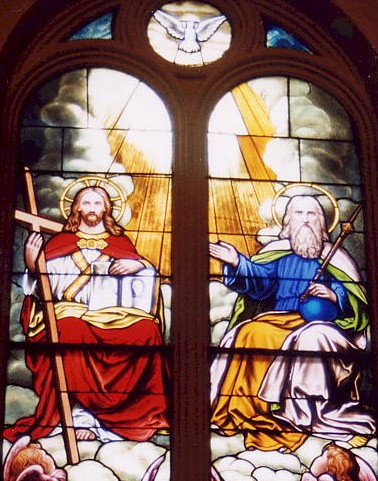
Matthew 3: 13-17
Then Jesus appeared: he came from Galilee to the Jordan to be baptised by John. John tried to dissuade him, with the words, ‘It is I who need baptism from you, and yet you come to me!’ But Jesus replied, ‘Leave it like this for the time being; it is fitting that we should, in this way, do all that uprightness demands.’ Then John gave in to him.
And when Jesus had been baptised he at once came up from the water, and suddenly the heavens opened and he saw the Spirit of God descending like a dove and coming down on him. And suddenly there was a voice from heaven, ‘This is my Son, the Beloved; my favour rests on him.’
(2)
I pray so deeply through the intercession of
Mary under the cross —
united to the sacrifice of Jesus —
the Mass, the sacrifice of Calvary sacramentally
made present — through the consecrated hands
of the priest
I unite so deeply to Jesus in the Mass
Praying to the Father
With all the angels and saints and souls in purgatory
We see that Jesus did what He did in perfect
compliance to the Father's will —In uniting to the Mass our interior disposition
should be such — we are living in accord
to the Father's willWhen we disconnect from authority we are like
a ship lost at sea.Our first rule is obedience to the Father's
will to offer a more pure sacrifice —INTERIOR DISPOSITION
Offering of recipient should be with
a pure interior disposition — pure
intention — in accord with the Father's
willRecognizing all power comes from God —
given to us
given to those in authority —When we disobey God
When we disobey authority —
we cut off that flow of God's power
coming through those chosen by Him
to do His work - over us —(3)
Jesus' offering of himself was a total offering — The offering contained the entire life of Jesus — although, Fr. Carter says, Jesus' sacrifice became formalized only at the Last Supper and upon Calvary, it nevertheless embraced his entire life.
(4)
Fr. Carter says "The offering, or sacrifice, of Jesus contained, then, his teaching, his healing the sick, his acts of kindness to the poor
and the ignorant and the unimportant, his patient training of the apostles—all this and more was included.(5)
Jesus' offering also included his personal relationships with Mary, Joseph, Lazarus, and others; it embraced, as well, his thrill at the beauty of nature, the simple joys shared with friends, his welcoming the children who loved to come to him, the enthusiasm and zeal that buoyed him as he went about his Father's business.
(6)
Moreover, Jesus' sacrifice included his endurance of the unpleasant side of the human condition—the pettiness and meanness of some, the hardness of heart he often encountered, the ugly selfishness that bursts forth and often mars the beauty of the person and that, ultimately, put Jesus to death.
(7)
Unlike Christ's earthly sacrifice, which he and he alone offered to the Father, the Eucharist, by God's gracious design, is also the Church's sacrifice. It is Christ's sacrifice, but it is also ours, for we are priests and victims along with Jesus, the chief priest and chief victim.
(8)
As Christ's offering of himself is renewed and continued in the Mass, our offering of ourselves is also included.
(9)
Furthermore, just as Christ's earthly offering included everything in his life, so also the offering that we make of ourselves at the Eucharist is meant to touch all the authentic experiences of our Christian lives. Our friendships, our love for one another, our service to mankind—all this is part of our eucharistic offering. Bearing properly with physical pain, frustration, failure, misunderstanding, boredom, anguish of spirit—this, too, we offer at the altar. To love and be loved by another human—and to be in wonder at this mystery of love—is also a cherished part of our eucharistic offering. To enjoy a meal together —
Jesus chose a meal to give Himself to us —
In today's world — in our relationships our
every day meals should be holy —
a special gift we share — God has given(10)
Selfishness and Appetites out of control go together
We eat to give honor and glory to God
To sustain our life to serve Him —
Anger, indulgence at mealtime is
against God's will —
God gives us Himself in the Eucharist — a meal —
to build communion and strength in the
body of Christ
God gives us physical meals to sustain life —
build relationship — give thanks and
praise Him — to build the family,
the community of love —
Marriage at Cana
(1) John 2: 1-11
On the third day there was a wedding at Cana in Galilee. The mother of Jesus was there, and Jesus and his disciples had also been invited. And they ran out of wine, since the wine provided for the feast had all been used, and the mother of Jesus said to him, ‘They have no wine.’ Jesus said, ‘Woman, what do you want from me? My hour has not come yet.’ His mother said to the servants, ‘Do whatever he tells you.’ There were six stone water jars standing there, meant for the ablutions that are customary among the Jews: each could hold twenty or thirty gallons. Jesus said to the servants, ‘Fill the jars with water,’ and they filled them to the brim. Then he said to them, ‘Draw some out now and take it to the president of the feast.’ They did this; the president tasted the water, and it had turned into wine. Having no idea where it came from—though the servants who had drawn the water knew—the president of the feast called the bridegroom and said, ‘Everyone serves good wine first and the worse wine when the guests are well wined; but you have kept the best wine till now.’ This was the first of Jesus’ signs: it was at Cana in Galilee. He revealed his glory, and his disciples believed in him. After this he went down to Capernaum with his mother and his brothers and his disciples, but they stayed there only a few days.
(2) God chose a marriage — a
gathering with
wine and food to be the seat of His
first public miracle.
God wants unity
— working for Him — not
forming comfortable, selfish, cubby
holes
where we fight at meals and
gatherings because
"we want, what we want"
(3)
The Eucharist, then, gathers up what would otherwise be the too-fragmented pieces of our lives and gives them a marvelous unity, a Christ-like unity. The Eucharist permeates these pieces of our lives with the love, the beauty, and the strength of Jesus' own offering and then presents them to the Father under the guidance of the Holy Spirit. We see, then, the richness and extensiveness of the eucharistic sacrifice's first element—the INTERIOR OFFERING.
(4)
The second element of sacrifice—that is, the external, ritualized offering—is easily recognized at each Eucharist because each Eucharist is a ritual of celebration.
Like we have special days of celebration with
family —
birthday, Christmas — Jesus wants
our unity —
not selfish — self pity, but
doing all
things in honoring Him for His honor and glory —
(5) The Eucharist is the main setting for the celebration of the Christian community —
Coming to Mass for a priest, sister,
brother, all of us should be a joy
focusing on the great event about
to take place —
Easter and Christmas are times God
wants
our undaunted love for Him —
To approach these celebrations — We
should
be interiorly
pure and exteriorly express
our joy in
celebrating such a Feast.
(6)
The daily liturgy can truly be called a celebration because a special event—the Christ-event that is centered in Jesus' death-resurrection—is always being called to memory and sacramentally re-enacted.
(7)
Each liturgy briefly raises us above—notice, we are not saying that each liturgy falsely separates us from—the ordinary setting of our lives. Refreshed by the special setting of the Eucharist and nourished by Christ himself, we are meant to return to the secular framework of life with a deepened desire to live Christ.
(8)
We can easily conclude from what we have been discussing that the externals of the liturgy should not become too commonplace. Certainly the rather rigid ritualism of the pre-Vatican II liturgy is not what we now judge to be desirable. Any celebration, despite the fact that it purports to be something quite different from what the participants daily experience, still must allow the participants to feel at ease with one another and the total situation. The setting of the Eucharist must likewise allow the participants to feel basically comfortable with one another and able to experience a sense of familiar connaturality with the celebration. On the other hand, if the Eucharist is celebration, its setting, its ritual, cannot become so ordinary that its participants tend to lose sense of the specialness of the event. Remember, one of the purposes of celebration is to provide a special type of experience, something quite different from the ordinary course of our lives. Consequently, the liturgy, as sign or ritual, has to achieve a rather delicate balance; it must be enacted in such a manner that we will feel at ease while, at the same time, it still remains something special.
(9)
The balance of ritual also has to be concerned with another factor. Ritual is also meant to be meaningful, that is, ritual is meant to point to the invisible realities of the liturgy in a way that is pertinent and attractive to the participants. The participants, for their part, have a responsibility toward the sign of the liturgy. The liturgy, as sign, presupposes the faith of the participants; no matter how perfect the external liturgy might be, it cannot be really meaningful to one who lacks faith. Conversely, the deeper the participants' faith is, the more meaningful is the liturgy of sign. We can also say that the more mature one's faith is, the better prepared he or she is to bear with possible deficiencies in the liturgy of sign. Persons of mature faith might well decry these shortcomings and take all reasonable steps to better the situation, but they will still love the Eucharist and derive deep meaning from it rather than give up participating in such a treasured event just because the external liturgy might be deficient.
(10)
The third element of sacrifice, immolation, touches Christ and us because we are both victims in the eucharistic offering. The immolation of both Jesus and us is, obviously, an unbloody one. Traditionally, the immolation of Jesus has been seen in the separate consecration of the bread and wine. Moreover, the very words of consecration manifest Christ as being in the state of victimhood.
Our immolation in the Eucharist is a mystical one. Summarily, we become victims with Christ by conforming our wills in love to the Father's will. Conformity was the essence of Christ's sacrifice, of his victimhood, of his immolation; a similar conformity must therefore be found in the victimhood and immolation of Christ's members. This mystical immolation is a lifelong process; each Eucharist that we participate in should mark a growth in our victimhood. As true Christians, we should desire to die more and more to all that is not according to God's will so that we might rise to greater life with Christ—both here upon earth and in eternity. Jungmann strikingly portrays the situation: "Every sacrament serves to develop in us the image of Christ according to a specified pattern which the sacramental sign indicates. Here the pattern is plainly shown in the double formation of the Eucharist; we are to take part in His dying, and through His dying are to merit a share in His life. What we here find anchored fast in the deepest center of the Mass-sacrifice is nothing else than the ideal of moral conduct to which the teaching of Christ in the Gospel soars; the challenge to an imitation of Him that is ready to lose its life in order to win it; the challenge to follow Him even, if need be, in His agony of suffering and His path of death, which are here in this mystery so manifestly set before us" (The Mass of the Roman Rite, p. 146).
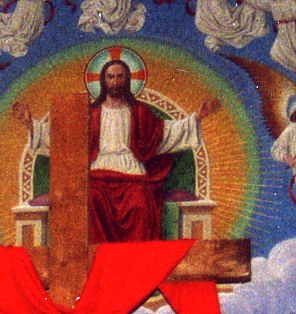
The Kingdom of God
(1)
Matthew 5: 3-10
How blessed are the poor in spirit:
the kingdom of Heaven is theirs.
Blessed are the gentle:
they shall have the earth as inheritance.
Blessed are those who mourn:
they shall be comforted.
Blessed are those
who hunger and thirst for uprightness:
they shall have their fill.
Blessed are the merciful:
they shall have mercy shown them.
Blessed are the pure in heart:
they shall see God.
Blessed are the peacemakers:
they shall be recognised
as children of God.
Blessed are those who are persecuted
in the cause of uprightness:
the kingdom of Heaven is theirs.
(2)
We have said that the fourth element of sacrifice refers to God's acceptance. If sacrifice is to have its desired effect, it must be pleasing to God. That the Father always accepts the eucharistic offering is certain, for the principal priest and victim is Jesus himself who is always supremely acceptable to the Father. What is more, the Father always accepts the subordinate priesthood and victimhood of the People of God, for even though the Eucharist may be offered through the sacrilegious hands of an unworthy priest, there is always a basic holiness in the Church that is pleasing to God. Because of this holiness, the Father always accepts the Church's sacrificial offering, for each Mass is the sacrifice of the whole Church and cannot be fundamentally vitiated by the basic unworthiness of any particular member or members—even if that member is the officiating priest.
(3) Building the Kingdom
God gives us the Mass
What do we say concerning the Father's acceptance of the sacrificial offering of the individual Christian? Such an offering will be acceptable in proportion to the Christian's conformity in love to the Father's will. Again, Jungmann has words for us: "It follows that an interior immolation is required of the participants, at least to the extent of readiness to obey the law of God in its seriously obligatory commandments, unless this participation is to be nothing more than an outward appearance" (Roman Rite, p. 146).
(4)
The last element of the eucharistic sacrifice, the meal, is, obviously, a very important part. The Eucharist as meal is a rich reality. It is the sign of Jesus' complete self-giving and, consequently, a sign of Jesus' fathomless love for us. This sign actually contains what it signifies. In the Eucharist, Jesus comes to us in his entirety. There is no holding back on his part; his boundless love for us results in boundless giving.
(5)
If the Eucharistic meal is a sign of Jesus' self-giving, it is also a sign of our self-giving. In receiving divine food, we pledge ourselves to a deeper God-like existence. We pledge that, in love, we will strive for a more radical giving of ourselves to both God and others. Each eucharistic meal that we participate in is a new opportunity for a more perfect assimilation to Christ and his mysteries, especially the mysteries of death and resurrection. Each eucharistic meal that we participate in increases our responsibility to live Christ, that is, to more fully incorporate the Gospel ideal in all that we do.
(6)
The fact that our participation in the eucharistic meal is a sign of our self-gift not only to God in Christ, but also to one another leads us to a consideration of the communal aspect of the meal. The eucharistic meal is a great sign and cause of our unity in Christ. Rahner maintains that "insofar as everyone participates in the same meal of Christ, who is the giver and the gift at the same time, the Eucharist is also the sign, the manifestation and the most real actualization of the church insofar as the church is and makes manifest the ultimate unity of all men in the Spirit, a unity which has been founded by God in grace" (Foundations of Christian Faith, p. 427). We are therefore to receive the one and same Christ, the implications of which are far-reaching. In receiving the one and same Christ we are actually pledging ourselves to unity both among ourselves and with all mankind. We are pledging ourselves to uproot from our hearts those attitudes that work against the building up of community in the Church and in the world. We are pledging ourselves to look upon others with a sense of respect, love, and even wonder as we marvel at how God's love has created and redeemed each one, at how the blood of Jesus has salvifically touched each one. Our participation in the eucharistic meal truly pledges us to these ideals. We, for our part, must ask ourselves whether we are actually assimilating these ideals. We must ask ourselves whether we are allowing the Eucharist to transform us into more loving and concerned persons, persons less and less influenced by forces that disrupt and tend to weaken and destroy communal unity.
(7)
The discussion of the communal aspect of the eucharistic meal reminds us that the entire eucharistic sacrifice is a covenant act. What is covenant? In the context of salvation history, a covenant is an agreement, a bond, a union, a life relationship both between God and his people and among the people themselves. At the Last Supper, Jesus emphasized the covenant aspect of the Eucharist: "During the meal Jesus took bread, blessed it, broke it, and gave it to his disciples. 'Take this and eat it,' he said, 'this is my body.' Then he took a cup, gave thanks, and gave it to them. 'All of you must drink from it,' he said, 'for this is my blood, the blood of the covenant, to be poured out in behalf of many for the forgiveness of sins' " (Mt 26:26-28).
(8)
When Jesus speaks of his blood as "the blood of the covenant," we are reminded that blood sealed or ratified the Mosaic covenant at Mt. Sinai. Moses sprinkled blood upon the altar, which represented God, and upon the Jewish people. Because blood was a distinctive symbol of life for the Jews, such an action had a deep significance for them. This action of Moses symbolized the sealing or ratification of the covenant—a new life relationship between Yahweh and the Jews.
(9)
The blood of Jesus has also formed a covenant—the new covenant. In the shedding of his blood, Jesus has established a new life relationship between his Father and mankind. Forming a core focal point of redeemed mankind are the people of the new covenant, namely, the members of the Christian community, the Church. The Eucharist, in recalling and sacramentally re-enacting the shedding of Jesus' covenant blood, is the Church's great covenant act. The Eucharist sustains the life of the covenant, nourishes it, causes it to grow to greater maturity. Through participation in the eucharistic liturgy we should be growing in covenant attitudes—in a sense of community, in a deep love of the Church, in a desire to contribute our share to the building up of this Body of Christ. We should be learning to curb our selfishness because it deadens a dynamic concern for the Christian community and makes us a burden to the brethren. Participation in the Eucharist should also be curbing divisive jealousy, forming us more and more as persons who want to deeply love one another so that it can more often be said of us, "See those Christians, how they love one another." The Eucharist can more radically shape us according to these covenant attitudes if we allow it. We repent concerning the times we have resisted; we rejoice concerning the times we have opened ourselves to the Eucharist's transformative power.
(10)
The individual Christian participates in the sacramentality of Jesus and the Church. In some ways, this participation differs according to one's vocation; a lay person, for example, does not participate in all ways the same as does the priest. There are, however, some ways we all share in common, one of which is our privilege and responsibility of signifying God's love. Because God in his love was the principal reality signified by Jesus in his incarnate existence, we, who help continue the Incarnation, must make the manifestation of love our principal concern. We must make sure that it is the controlling force of our Christian existence. We all know countless examples of Christians who have given outstanding witness to God's love, and the achievements to which that love can inspire others. History shows how Christians of all vocations have marvelously and, at times, brilliantly, spent themselves for one another and for mankind in general. In all honesty, however, we know that there is also a darker, unattractive side to our history. There are numerous and painful examples of how Christians have failed to give witness to the love that Jesus came to preach. We cannot undo these failures, but remembering them can help motivate us to repair the damage by loving—here and now—as we should.
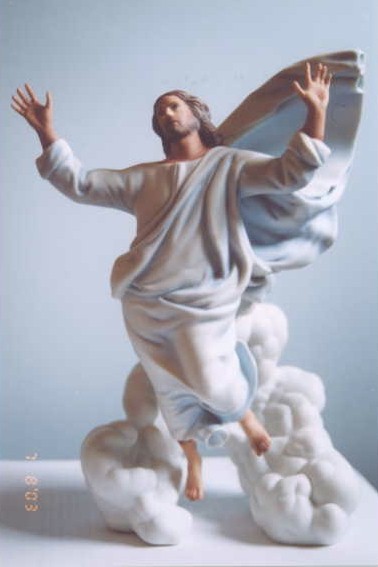
Transfiguration
(1) Matthew 17: 1-8
Six days later, Jesus took with him Peter and James and his brother John and led them up a high mountain by themselves. There in their presence he was transfigured: his face shone like the sun and his clothes became as dazzling as light. And suddenly Moses and Elijah appeared to them; they were talking with him. Then Peter spoke to Jesus. ‘Lord,’ he said, ‘it is wonderful for us to be here; if you want me to, I will make three shelters here, one for you, one for Moses and one for Elijah.’ He was still speaking when suddenly a bright cloud covered them with shadow, and suddenly from the cloud there came a voice which said, ‘This is my Son, the Beloved; he enjoys my favour. Listen to him.’ When they heard this, the disciples fell on their faces, overcome with fear. But Jesus came up and touched them, saying, ‘Stand up, do not be afraid.’ And when they raised their eyes they saw no one but Jesus.
(2)
Another dimension of the Church is the fact that she is a pilgrim Church, a fact that we have alluded to in an earlier chapter. This concept has various ramifications: A pilgrim Church, for example, has not yet arrived at her final destiny, has not yet achieved that fullness, that perfection, that complete maturity that will be hers only when she joins the heavenly Church—that portion that has already achieved eternal life. To be a mature member of a pilgrim Church, then, is to realize that there will always be many imperfections that will mar the beauty of the Church. Although these failings dim the Christ-like image of the Church and thus prevent her from projecting Christ to the world as well as she otherwise could, we have to realize that, to a certain degree, the Church will always be burdened with such failings.
(3)
In a general sense, then, a sacrament is a visible sign of an invisible, divine reality. Christ, therefore, is the primordial sacrament given to us by God. In his historical existence, Jesus was the visible, tangible manifestation that God has irrevocably entered our world with merciful, salvific grace. At the same time, Christ contained within himself this divine reality that he externally manifested. Thus, we quickly arrive at a fuller definition of sacrament in general—namely, a sacrament is a visible sign of an invisible, divine reality, that contains and confers what is signified.
(4)
In our sense of corporateness, that is, motivated by a common purpose and a common good, we should learn to rejoice in the gifts and the achievements of others. These are not isolated gifts and achievements; rather, they redound to the good of the whole body. We all probably know of numerous instances of jealousy and a false sense of competition that have hindered the work of Christ. In the long run, however, if the work of Christ is being accomplished, and if I am making an effort to do my part, does it really matter whether I or someone else is responsible for this or that particular accomplishment? Does it matter whether this or that group or organization receives credit? St. Paul again has words for us: "After all, who is Apollos? And who is Paul? Simply ministers through whom you became believers, each of them doing only what the Lord assigned him. I planted the seed and Apollos watered it, but God made it grow. This means that neither he who plants nor he who waters is of any special account, only God, who gives the growth. He who plants and he who waters work to the same end" (1 Cor 3:5-8).
(5)
Apparently, a growing number of persons today are tempted to think that they do not need the Church and its bonds of communion in order to be Christian. In fact, some say the Church is a hindrance to them in their attempts to live the Gospel message. Their uniqueness—their individuality—is being thwarted, they claim. This is a temptation that must be firmly resisted. There is, of course, an errant philosophy of individualism rampant in today's world that can certainly influence the contemporary Christian. This philosophy is patently false. It promotes a type of individualism that is inimical to community because it teaches that one must look out for Number One regardless of the consequences to others. Do your own thing, in other words, whenever and wherever you please, and let the chips fall where they may. This type of individualism is obviously wrong and pernicious.
(6)
The concept of the Church as Body of Christ certainly emphasizes the sense of corporateness that should permeate the consciousness of the Church's members. We must think in terms of both what is good for the entire Church and, through this Church, what is good for the total human community. Even when we disagree among ourselves, we do so not because we want to glory in having the upper hand, but because we believe that to disagree here and now is necessary so that the truth might better emerge for the good of the community. St. Paul speaks to us about this sense of corporateness: "In the name of the encouragement you owe me in Christ, in the name of the solace that love can give, of fellowship in spirit, compassion, and pity, I beg you: make my joy complete by your unanimity, possessing the one love, united in spirit and ideals. Never act out of rivalry or conceit; rather, let all parties think humbly of others as superior to themselves, each of you looking to others' interests rather than his own" (Phil 2:1-4).
(7)
Authentic interpersonal relationships help to develop community. The Trinitarian community is a community of profound relationships. Because we reflect Trinitarian community, we are intended to have relationships not only with the persons of the Trinity, but likewise with one another. Authentic interpersonal relationships not only unite in a deeper knowledge and love the persons directly involved, they also make a person more capable of loving others more deeply and, therefore, more capable of deepening the bonds of total community. If a person is growing in the capacity to love his or her friends, for example, that person is concurrently growing in the capacity to also love others—both those who are members of the Church and those who are not.
(8)
The Christian community, in turn, develops when those who make up that community develop as authentic Christians. Just as each divine person contributes perfectly to the community life of the Trinity according to the perfect fullness of his personhood, so each Christian contributes to community life in proportion to the degree of his or her personal development.
(9)
Because the life of the Trinity is person-centered, so must the life of the Christian community be person-centered. For many years, it seems, we were not sufficiently person-conscious; however, the theology that has emanated from Vatican II is helping to rectify this situation. In the pre-Vatican II Church, structures in the Church were occasionally treated as ends in themselves rather than as the means of serving the persons in the Church. Slowly but surely, structures in the Church are being renewed so that they might better serve their true purpose, which is to aid in the ongoing development of her members.
(10)
Grace, or the Christ-life, is a created participation in Trinitarian life. This Christ-life, consequently, calls us to a special existence of knowing and loving. Christian faith and love, which are created participations in the Trinity's knowing and loving, allow us to know and love God in a special manner. Faith and love also give us a new capacity to relate to both our fellow Christians and to all others as well.
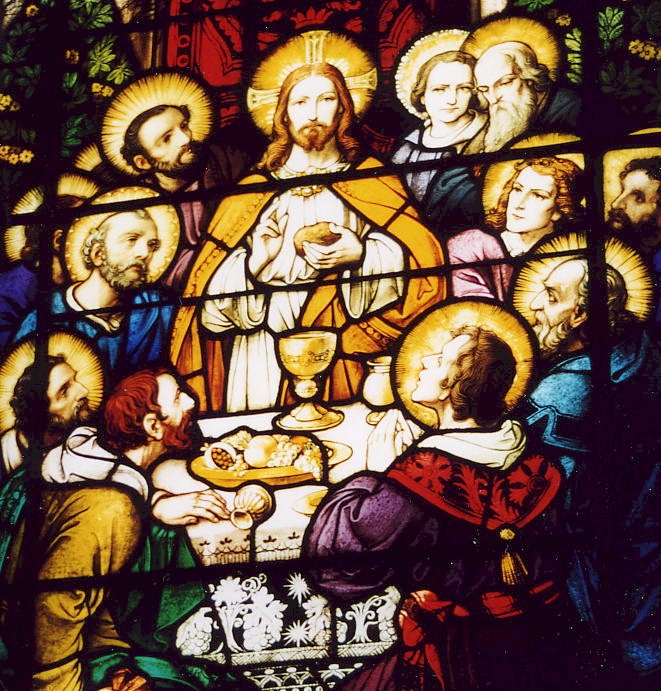
The Institution of The Eucharist
(1) Mark 14: 12-16, 22-26
On the first day of Unleavened Bread, when the Passover lamb was sacrificed, his disciples said to him, ‘Where do you want us to go and make the preparations for you to eat the Passover?’ So he sent two of his disciples, saying to them, ‘Go into the city and you will meet a man carrying a pitcher of water. Follow him, and say to the owner of the house which he enters, "The Master says: Where is the room for me to eat the Passover with my disciples?" He will show you a large upper room furnished with couches, all prepared. Make the preparations for us there.’ The disciples set out and went to the city and found everything as he had told them, and prepared the Passover.
And as they were eating he took bread, and when he had said the blessing he broke it and gave it to them. ‘Take it,’ he said, ‘this is my body.’ Then he took a cup, and when he had given thanks he handed it to them, and all drank from it, and he said to them, ‘This is my blood, the blood of the covenant, poured out for many. In truth I tell you, I shall never drink wine any more until the day I drink the new wine in the kingdom of God.’
After the psalms had been sung they left for the Mount of Olives.
(2)
The Church's existence centers in her liturgy: "The liturgy is the summit toward which the activity of the Church is directed; at the same time it is the fount from which all her power flows" (Vatican II, Constitution on the Sacred Liturgy, no. 10). Furthermore, the Church's liturgical life is centered in the sacraments and, most especially, in the eucharistic sacrifice. We will briefly consider the sacraments in general, and then more extensively develop ideas about the Mass.
(3)
In the previous chapter, we stated that the Church, in union with Christ, her head, helps continue the work of Jesus according to the pattern of Jesus. One aspect of Christ's existence, we stated, was that he was the primordial sacrament of God. We concluded, therefore, that the Church is also sacrament. The Church's sacramentality is then actualized in a special manner through the seven sacraments. In the same way that the Church in general is the visible continuation of Christ's Incarnation, so also can her individual sacraments be considered particular, visible extensions of Jesus.
(4)
It is evident, therefore, why the sacraments are special encounters with Christ. Jesus unites himself with the sacramental sign as he offers his grace to the recipient. In this sense, Christ and his sacraments become one; the sacrament and its minister are merely instruments that Christ employs to give himself anew. The primary sacramental encounter is between Jesus and the recipient.
(5)
Christ offers himself through the Church and her sacraments so that we might become ever more united to him. This incorporation into Christ begins at baptism, through which the Christian becomes a member of both Christ and the Church. What is more, this incorporation into the life of Christ means being incorporated into his paschal mystery because death-resurrection was the summary mystery of Christ's existence. Death-resurrection was the central mystery whereby Christ gave us life, and it is the central mystery that the Christian must relive in Christ.
(6)
Each one of the sacraments deepens our incorporation into Jesus' death-resurrection; each one achieves this in a somewhat different manner according to its primary purpose; finally, and very importantly, each of the sacraments deepens this incorporation within an ecclesial framework. The sacraments, because they are realities of both Christ and his Church, intensify the Christian's relationship not only with Jesus, but also with the members of the Church and, ultimately, with all others.
(7)
The death-resurrection of Jesus, which is encountered in a special way through the sacraments, is most especially renewed in the eucharistic sacrifice. Consequently, we can see the logical connection between the sacraments and the Mass. Indeed, all of the sacraments point to the Mass.
(8)
The eucharistic sacrifice renews and summarizes the Christ-event, and likewise summarizes our participation in this mystery of Jesus. Obviously, then, the Eucharist is a multisplendored reality. All dimensions of the Eucharist are profoundly interlinked with one another; as a matter of fact, all are dimensions of the Eucharist as sacrifice because the sacrificial note is the fundamental characteristic. We say fundamental because we presuppose the idea of Christ's real presence in the Eucharist. These two aspects have always been stressed in Church teaching, as Richard McBrien has pointed out: "Catholic eucharistic doctrine has been focused on two issues: the sacrificial nature of the Mass and the real presence of Christ in the consecrated elements of bread and wine. It is official Catholic teaching . . . that the Mass is a true sacrifice . . . without diminishing the value of the sacrifice of Calvary. Christ is the same victim and priest in the Eucharist as he was on the cross, although the mode of offering is different at Mass. The sacrifice of the cross was a bloody sacrifice; the sacrifice of the Mass is unbloody" (Catholicism, vol. 2, p. 763). Because the idea of sacrifice is so fundamental to the understanding of the Mass, we will begin our discussion of the Eucharist from this perspective.
(9)
Christ's redemptive activity can be placed within the framework of sacrifice, a framework that had been developing over the centuries before the coming of Jesus. The theology of sacrifice can be summarized according to five elements: (1) the interior offering; (2) the external, ritual offering centered around a victim; (3) the immolation of the victim; (4) the acceptance of the sacrifice by God; and (5) the sacrificial meal.
(10)
A very critical element of these five is the first, the interior offering. Our first duty is to surrender ourselves to God out of love; this fact flows from the truth that God is the Creator and we are his creatures. If we are ideally to fulfill our creaturehood, we must respond as perfectly as possible to the loving demands of our Creator. Because we ourselves and the gifts of creation that surround us are from God, we should offer ourselves completely to the Creator. Our gift of self to God is, in turn, centered in loving conformity to the divine will.
We can send Fr. Joe's
homily book to a priest
for a little over a dollar.
Can you please help us get
these homilies to the priests?

Please help us with your donation.
Call Shepherds of Christ
1-888-211-3041
Prayer Cards available
Holy Spirit Prayer Act of Consecration to
Immaculate Heart of MaryAct of Consecration to
Sacred Heart of JesusPrayer for Priests
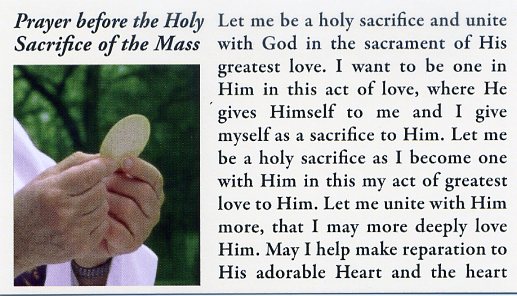 |
| Prayer before the Holy Sacrifice of the Mass |
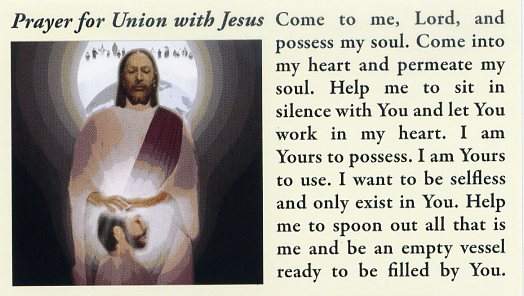 |
|
Prayer for Union with Jesus |
Available for .25¢ each plus postage
Call Shepherds of Christ
1-888-211-3041
Prayer Card 4" x 6"
.50¢ each plus postage
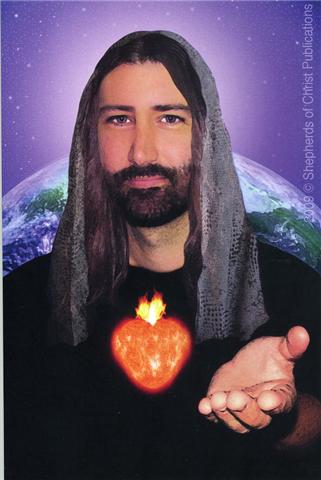

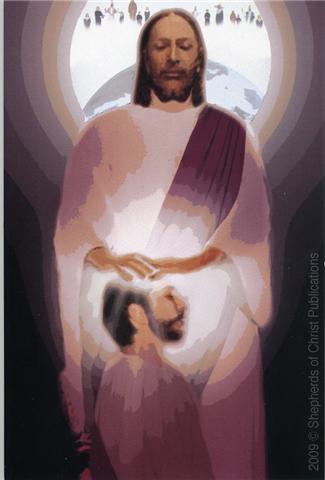
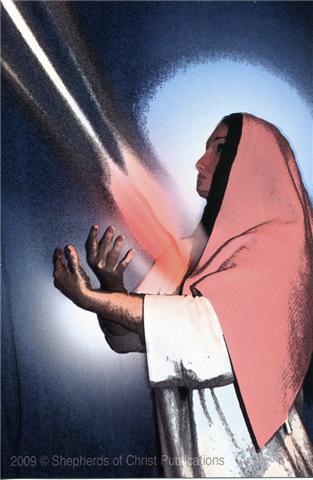
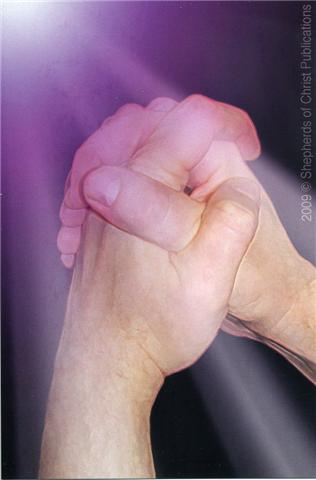
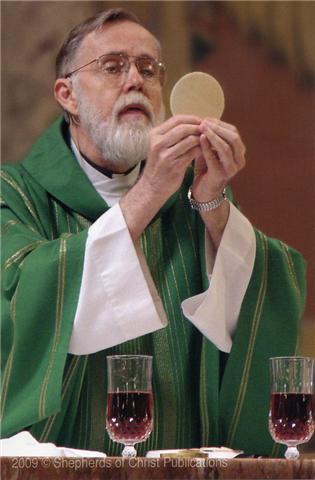
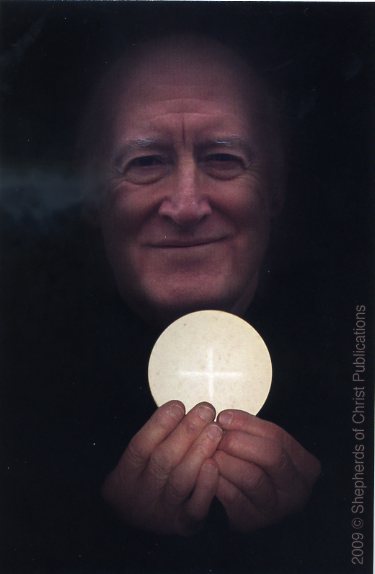
size 5 1/2" x 8 1/2"
$1.00 plus postage
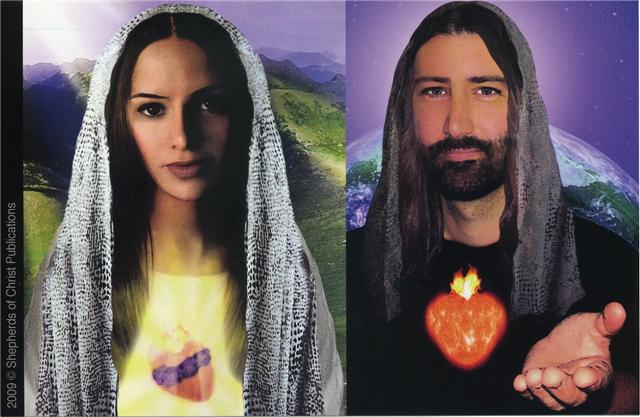
Statues
Sacred Heart of Jesus w/glass - 18
Our Lady-Guadalupe w/glass - 12
Limpias - 8
Immaculate Heart w/glass - 18
I Heart - Ivory w/glass - 18
Our Lady of Grace w/glass - 18
Our Lady-Mt. Carmel w/glass - 18
Our Lady of Lourdes w/glass - 18
Infant of Prague w/glass - 24
Sacred Heart of Jesus w/glass - 24
Sacred Heart -Blessing w/glass - 24
Sorrowful Mother w/glass - 24
I Heart - Ivory w/glass - 24
I Heart of Mary w/glass - 24
Our Lady of Lourdes w/glass - 24
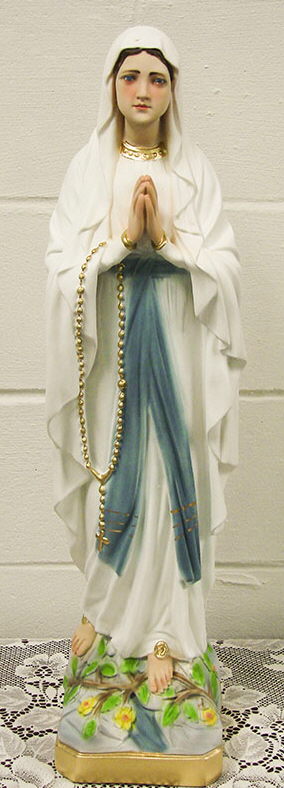
Our Lady-Guadalupe w/glass - 28
Our Lady of Grace w/glass - 24
Our Lady-Mt. Carmel w/glass - 24
Fatima w/glass - 11
Pilgrim Virgin w/glass - 12
Pilgrim Virgin w/glass - 15
Fatima w/glass - 18
Pilgrim Virgin w/glass - 18
Pilgrim Virgin w/glass - 27
St. Padre Pio
St. Joseph
St. Therese
St. Francis
St. Anthony
St. Claire
Limpias
St. Jude
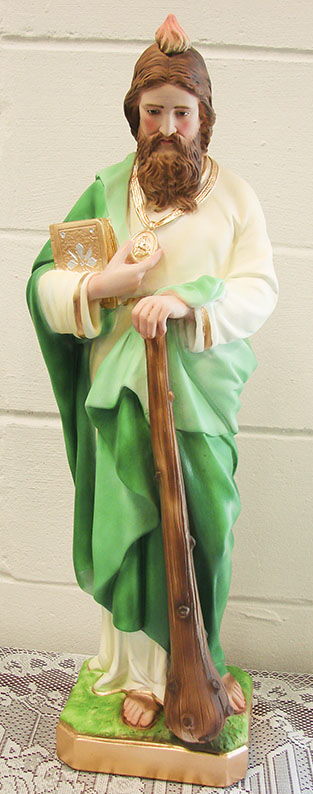
Divine Mercy
Holy Family
Angel
St. Philomena
Pieta - Marble
Pieta - Color
Holy Family
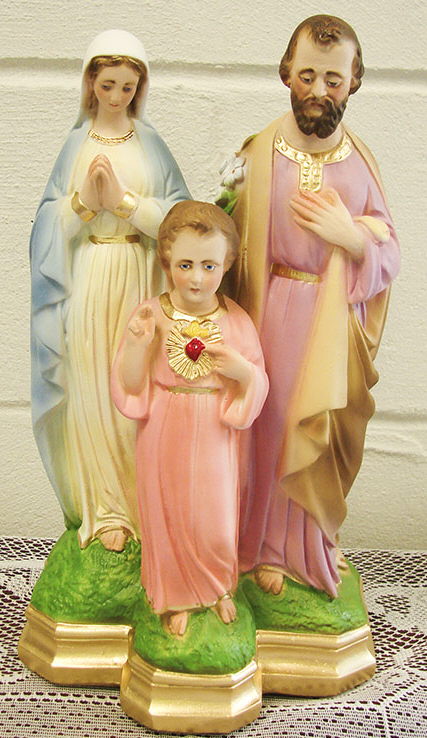
St. Anthony - 18
St. Francis - 18
St. Joseph - 18
St. Therese - 18
St. Rita - 18
St. Clare - 12
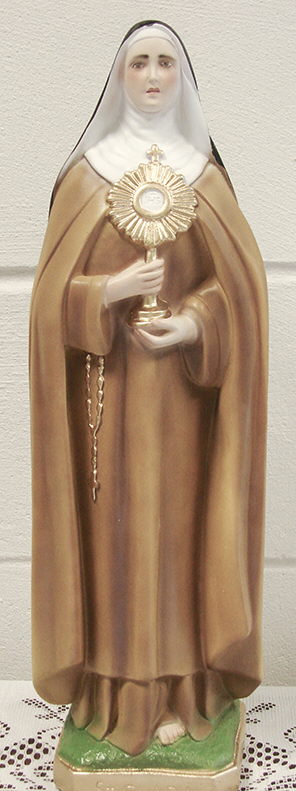
St. Rita - 12
St. Padre Pio - 12
Divine Mercy - 12
Shepherds of Christ Ministries
P. O. Box 627
China, IN 47250
Toll free - 1-888-211-3041
Local - 1-812-273-8405
fax - 1-812-273-3182
web: www.sofc.org
e-mail: info@sofc.org
Size Price Quantity Holy Family
24"
$180
Limpias
24"
$125
St. Anthony
24"
$125
St. Claire
24"
$125
St. Francis
24"
$125
St. Joseph
24"
$125
St. Jude
24"
$125
St. Padre Pio
24"
$125
St. Therese
24"
$125
Divine Mercy 22"
$125 Angel 22"
$100 St. Philomena 20"
$100 St. Philomena 16"
$65 St. Joseph 18"
$65 St. Francis 18"
$65 St. Anthony 18"
$65 St. Rita 18"
$65 St. Therese 18"
$65 Pieta - Color 15" $75 Pieta - Marble 15" $75 Holy Family 12"
$60 St. Padre Pio - standing 12"
$40 St. Padre Pio - sitting 8"
$50 St. Rita 12"
$40 Divine Mercy
12"
$40 St. Claire 12"
$40 Limpias 8"
$25 Our Lady of Guadalupe w/glass 28"
$500 Our Lady of Mt. Carmel w/glass 24"
$500 Immaculate Heart of Mary w/glass
24"
$500 Immaculate Heart - Ivory w/glass
24"
$500 Infant of Prague w/glass
24"
$500 Our Lady of Grace w/glass
24"
$500 Our Lady of Lourdes w/glass
24"
$500 Sacred Heart of Jesus w/glass 24"
$500 Sacred Heart -Blessing w/glass 24"
$500 Sorrowful Mother w/glass
24"
$500 Immaculate Heart of Mary w/glass 18"
$300 Immaculate Heart - Ivory w/glass 18"
$300 Sacred Heart of Jesus w/glass 18"
$300 Our Lady of Lourdes w/glass 18"
$300 Our Lady of Grace w/glass 18"
$300 Our Lady of Mt. Carmel w/glass
18" $300 Our Lady of Guadalupe w/glass 12"
$200 Fatima w/glass
11"
$150 Fatima w/glass
18"
$250 Pilgrim Virgin w/glass 12"
$160 Pilgrim Virgin w/glass 15" $200 Pilgrim Virgin w/glass 18" $250 Pilgrim Virgin w/glass 27"
$450
Call for Shipping Price (1-888-211-3041)
Name
Sub-Total Address
IN Tax (7%) City
Shipping State Zip
Donation Telephone
Order Total
Shepherds of Christ
P. O. Box 627
China, IN 47250
Call Shepherds of Christ
1-888-211-3041
Fr. Joe's Homily Books
Guiding Light -
The Word Alive in Our Hearts$10.00
Guiding Light -
Focusing on the Word$10.00
Fr. Carter's Books
Priestly Newsletter Book I
12 Newsletters
July 1994 - June 1996$12.00
Priestly Newsletter Book 2
17 Newsletters
1996 - 1999$12.00
Priestly Newsletter Book 3
4 Newsletters & Prayers
2000$12.00
Synopsis of the Spiritual Life
Spirituality Handbook
$3.00
Messages given
by Jesus and Mary 1994
Tell My People
$10.00
The Pain and the Joy
$10.00
Priestly Newsletter on CD
2000 - Issue 1
$10.00
Priestly Newsletter on CD
2000 - Issue 2
$10.00
Fr. Pasquini's Books
Authenticity
Prayers and Meditations
$10.00In Imitation of Two Hearts
For those suffering or
in Nursing Homes
$10.00Light, Happiness and Peace
Journeying through traditional
Catholic Spirituality$10.00
Medicine of Immortality
Prayers and Meditations - will assist the reader in growth toward a deeper understanding of the mystery of the Eucharist
$10.00
Ecce Fides - Pillar of Truth
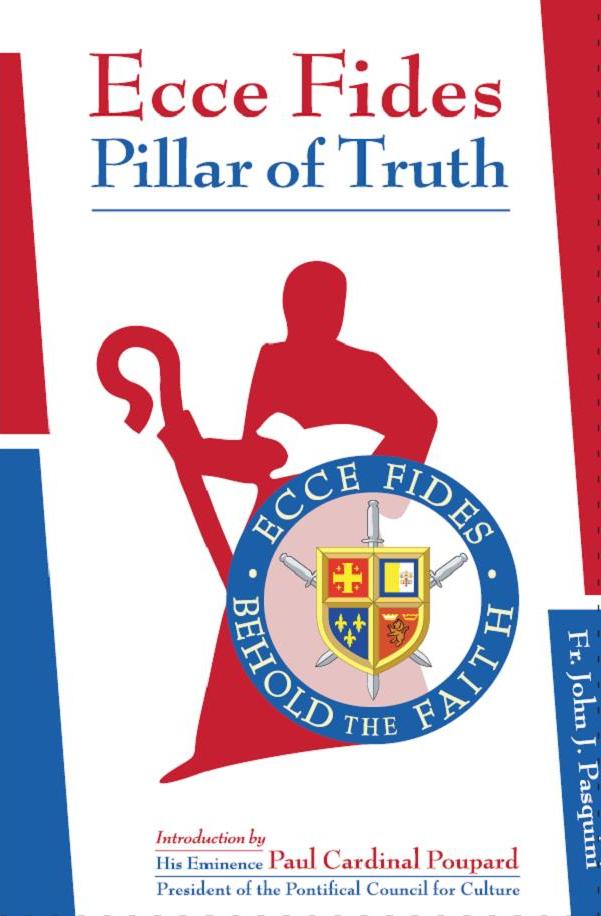
Ideal for RCIA, Adult & Youth Bible Study, Homeschooling, Catholic
Identity Studies$10.00
Shepherds of Christ Newsletters
9 Newsletters
2006 - 2008
$36.00
DVDs and CDs by Fr. Pasquini
Authenticity DVD
Prayers on the Ocean$10.00
Nursing Home Mass DVD
$10.00
Consolation DVD
$10.00
Medicine of Immortality
Read by Rita Ring2 CDs - $17.00
In Imitation of Two Hearts DVD
$10.00
Consolation CD
by Fr. John$8.00
Nursing Home Mass CD
$8.00
Holy Spirit Novena DVD
$10.00
Divine Mercy Chaplet DVD
$10.00
plus shipping
Call Shepherds of Christ
1-888-211-3041
God’s Blue Books
God’s Blue Book 1 –
Teachings to Lift You Up$10.00
God’s Blue Book 4 –
The Love of the Hearts of
Jesus and Mary$5.00
God’s Blue Book 2 –
The Fire of His Love$10.00
God’s Blue Book 5 –
So Deep Is the Love of His Heart$5.00
God’s Blue Book 3 –
Love God, Love One Another
(Fr. Carter's favorite)
$10.00
God’s Blue Book 6 –
He Calls Us to Action$10.00
Rosary Books
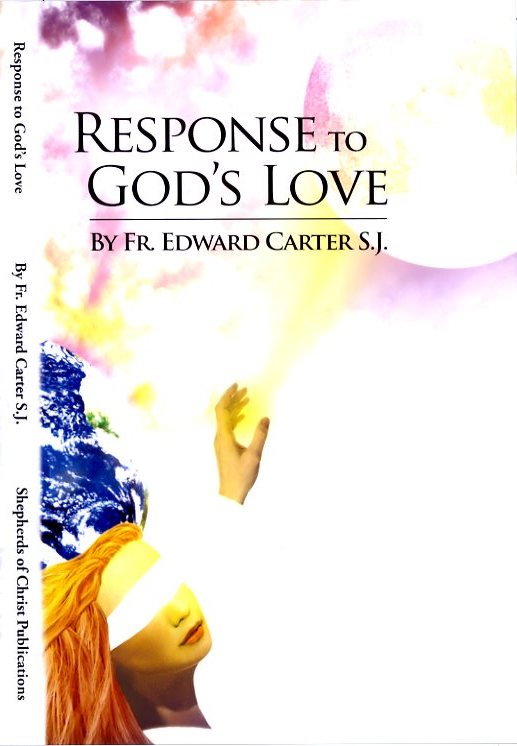
Available for $10.00 each plus postage
1-888-211-3041
Call Shepherds of Christ
We are trying to get
Response to God's Love
and the Mass Book out.
Anybody who wants to help us
with a donation to get these 2 books
out in the Priestly/hierarchy mailing —
Please call Shepherds of Christ
1-888-211-3041
July 31, 1994
Words of Jesus to Members of
Shepherds of Christ Associates:"My beloved priest-companion, I intend to use the priestly newsletter, Shepherds of Christ, and the movement, Shepherds of Christ Associates, in a powerful way for the renewal of My Church and the world.
"I will use the newsletter and the chapters of Shepherds of Christ Associates as a powerful instrument for spreading devotion to My Heart and My Mother's Heart.
"I am calling many to become members of Shepherds of Christ Associates. To all of them I will give great blessings. I will use them as instruments to help bring about the triumph of the Immaculate Heart and the reign of My Sacred Heart. I will give great graces to the members of Shepherds of Christ Associates. I will call them to be deeply united to My Heart and to Mary's Heart as I lead them ever closer to My Father in the Holy Spirit."
- Message from Jesus to Father Edward J. Carter, S.J., Founder, as given on July 31, 1994,
feast of Saint Ignatius Loyola, Founder of the Society of Jesus (The Jesuits)
The China Church is over 140 years old
and we pray in there 24 hours a day.
It needs stucco and so does
the community building.
Can you please help us?
Call Shepherds of Christ
1-888-211-3041
Likewise the priest house
is 150 years old.
Jesus told us to repair it
which we have been doing.
We need $13,000.00 for this work.
You can help put the Blue Book V
in the hands of 1,000 people
we need $1,200 postage for this
It is ready to go
Call Shepherds of Christ
1-888-211-3041
You can help put Fr. Joe's homily
book in the hands of
1,000 priests — it costs $1,100
This can help 1,000 parish priests
talk about Covenant for Lent
Please help us
It is ready to go
Call Shepherds of Christ
1-888-211-3041
Crucifix — hand carved by Felix
Available for $750.00
Brand New Internet Store